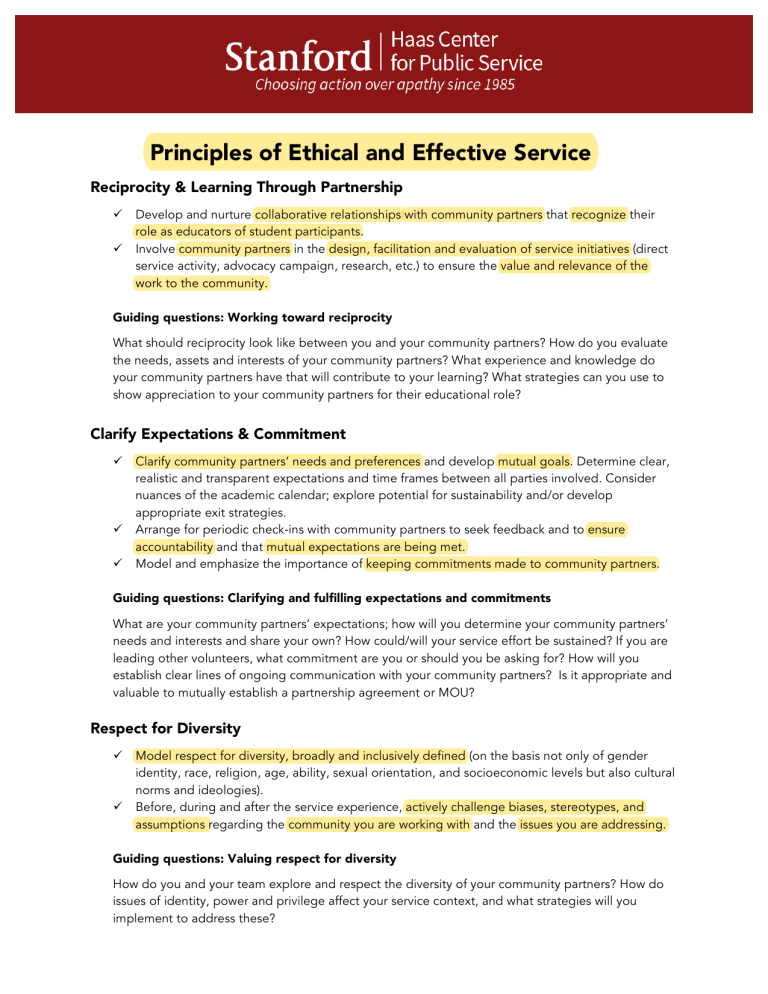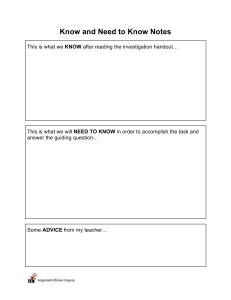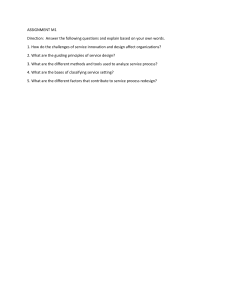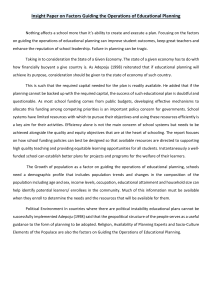7.2 EPOPS 2020 Haas Principles of Ethical and Effective Service
advertisement

! ! Principles of Ethical and Effective Service Reciprocity & Learning Through Partnership ! ! Develop and nurture collaborative relationships with community partners that recognize their role as educators of student participants. Involve community partners in the design, facilitation and evaluation of service initiatives (direct service activity, advocacy campaign, research, etc.) to ensure the value and relevance of the work to the community. Guiding questions: Working toward reciprocity What should reciprocity look like between you and your community partners? How do you evaluate the needs, assets and interests of your community partners? What experience and knowledge do your community partners have that will contribute to your learning? What strategies can you use to show appreciation to your community partners for their educational role? Clarify Expectations & Commitment ! ! ! Clarify community partners’ needs and preferences and develop mutual goals. Determine clear, realistic and transparent expectations and time frames between all parties involved. Consider nuances of the academic calendar; explore potential for sustainability and/or develop appropriate exit strategies. Arrange for periodic check-ins with community partners to seek feedback and to ensure accountability and that mutual expectations are being met. Model and emphasize the importance of keeping commitments made to community partners. Guiding questions: Clarifying and fulfilling expectations and commitments What are your community partners’ expectations; how will you determine your community partners’ needs and interests and share your own? How could/will your service effort be sustained? If you are leading other volunteers, what commitment are you or should you be asking for? How will you establish clear lines of ongoing communication with your community partners? Is it appropriate and valuable to mutually establish a partnership agreement or MOU? Respect for Diversity ! ! Model respect for diversity, broadly and inclusively defined (on the basis not only of gender identity, race, religion, age, ability, sexual orientation, and socioeconomic levels but also cultural norms and ideologies). Before, during and after the service experience, actively challenge biases, stereotypes, and assumptions regarding the community you are working with and the issues you are addressing. Guiding questions: Valuing respect for diversity How do you and your team explore and respect the diversity of your community partners? How do issues of identity, power and privilege affect your service context, and what strategies will you implement to address these? Preparation ! ! ! Prepare for a service initiative with the attitudes, skills, knowledge, and materials you need to serve effectively. Understand the context in which the service experience is embedded: share current and historical information about the partner organizations and communities, and the impact of political, economic, environmental, and social contexts. Seek advice from community partners in determining content, and involve them in preparing or training students whenever possible. Guiding questions: Improving student preparation How will you build preparation into your program design? What would be beneficial for you to learn or do before engaging with the community and/or social issue? What resources are available that might deepen your understanding of the context surrounding your service initiative? How has your academic work prepared you for this experience? Safety & Wellbeing ! ! Anticipate and take steps to ensure the physical and emotional safety of all service initiative participants. Understand and comply with special safety or liability requirements of community partners and the university Guiding questions: Ensuring safety What are the particular safety concerns in your service initiative? Have you spoken with your community partner(s) and university adviser about safety issues and made plans to mitigate risk? Reflection & Evaluation ! ! Intentionally and creatively build in opportunities to reflect throughout your service experiences, involving community partners when possible. Include opportunities to gather regular feedback from community partners and participants to assess value, refine practice, and inform future actions. Guiding questions: Incorporating reflection & evaluation When, where and how will you incorporate reflection opportunities into your experience? How do you make a safe space for participants to reflect? How will you measure success? What method(s) and/or tools will you utilize to collect feedback and evaluate impact? Humility ! ! Serve with a listening and learning attitude ever mindful of the community’s needs, assets, and interests; and their own expectations, limitations, and capacity to serve. View any service work you are asked to do as a valuable learning opportunity that complements knowledge and builds understanding. Guiding questions: Working toward humility How will you prepare yourself and your team to be humble and respectful in service experiences? What does humility look like in your service context; how will you demonstrate this?



